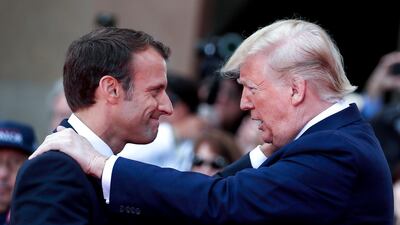French President Emmanuel Macron said he shares the "same objectives" on Iran as his US counterpart Donald Trump, as the two leaders met in Normandy, northern France on Thursday
The US President and Mr Macron held their own private talks on the sidelines of a second day of events to mark the 75th anniversary of the D-Day, when Allied Forces began the assault to push Nazi soldiers out of France.
Tens of thousands gathered to honour those who fought in France and a number of veterans from the invasion, the youngest of whom are in their 90s.
US-French relations have been strained recently over Mr Trump’s support of populist leaders in Europe, as well as the US president’s withdrawal the Paris Agreement on climate change and from the Iran nuclear deal.
But striking a more conciliatory tone on Iran after the meeting with Mr Macron, Mr Trump told reporters: “I don’t think the president wants to see nuclear weapons and neither do I.”
The French president agreed adding that he agreed with Mr Trump that a "new negotiation" with Tehran was needed.
During Mr Trump's state visit to the UK, where he also held talks with British prime minister Theresa May, he said he was prepared to talk with Iran but that there was "always a chance" of US military intervention if Tehran developed its nuclear programme.
Mr Macron met Mrs May on Thursday morning to launch the construction of a British memorial at Ver-sur-Mer. The trip to France is one of the British prime minister’s last official events before she resigns as Conservative leader on Friday.
Mr Macron paid tribute to soldiers in English, as well as naming all the nations that had participated in the Allied forces attack.
“We should never cease to keep alive the alliance of free nations,” Macron said. “It’s what the US did in creating in NATO, what did the leaders of this continent did in creating the European Union.”
He also paid tribute to Mrs May, whom he said he was proud to have worked with.
"Leaders may come and go but their achievements remain. The force of our friendship will outlast current events," he said.
Canada’s prime minister Justin Trudeau attended a ceremony at the site where Canadian forces were in charge of the assault, Juno Beach.
German Chancellor Angela Merkel, who attended the first day of commemorations in Portsmouth on Wednesday, will not visit France.
While Russia’s Vladimir Putin did not receive an invitation to either events, despite being invited to the 60th anniversary of D-Day in 2004.
Moscow’s relations with the West reached their lowest point since the Cold War after the Salisbury Novichok poisonings, which resulted Russian diplomats being expelled in countries in Europe and the US.
Russia's foreign ministry said on Wednesday that the importance of the Allied invasion of northern France should not be exaggerated and that it was the Soviet Union’s intervention that won the Second World War.
D-Day was the largest seaborne assault in history and saw 156,000 US, British, Canadian and other Allied troops.
On the first day alone an estimated 4,400 troops died, many of whom were American.
Mr Trump visited a US military cemetery at Colleville-sur-Mer, the site of 9,400 graves of American soldiers.
Both Mr Trump and his French counterpart gave speeches and Mr Macron bestowed the Legion d'Honneur, France's highest honour, on five US veterans.
Mr Trump praised the 60 American veterans who had made the trip to France for the ceremony.
“Our cherished alliance was forged in the heat of battle, tested in the trials of war and proved in the blessings of peace,” he said. “Americans are drawn to this place as though it were part of our very soul.”

